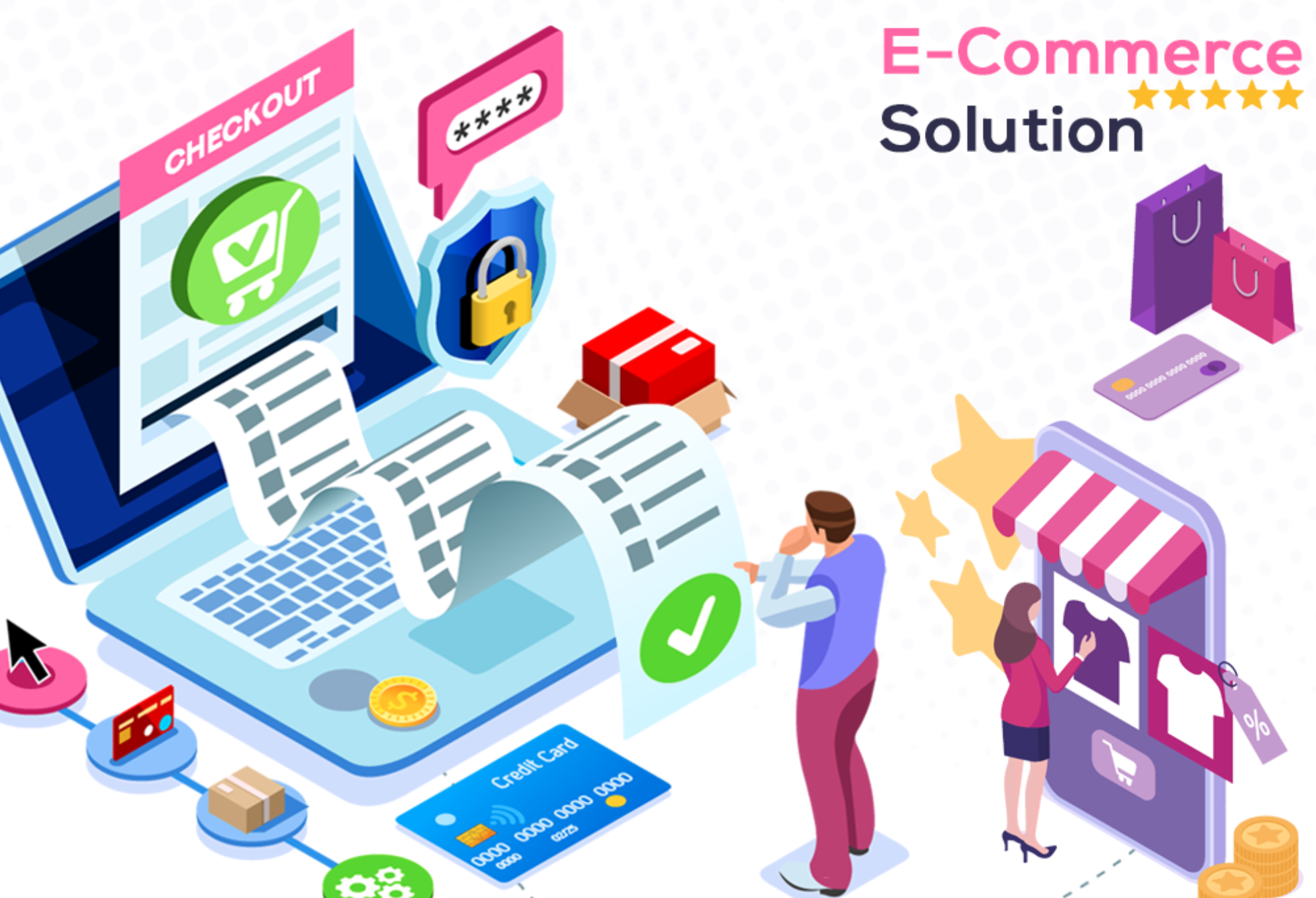The e-commerce industry is growing at an exponential rate. Global e-commerce sales exceeded $5.7 trillion in 2023 alone, and this trend doesn’t appear to be abating [source: statista.com]. Having a strong online presence is now crucial for organizations of all kinds in order to thrive and survive.
Robust e-commerce solutions are useful in this situation. These platforms enable companies to easily interact with consumers, manage items, handle payments, and establish online storefronts. But it might be intimidating to choose the best e-commerce solution because there are so many alternatives accessible.
You can find your way around the world of e-commerce solutions with the help of this thorough guide. We’ll go over the various kinds of platforms, their features, and important things to think about before choosing one.
Comprehending E-Commerce Solutions
In essence, an e-commerce solution is a software platform that gives companies the resources they require to run an online store. It acts as the framework for your online store, managing a number of vital tasks like:
Product management is the process of adding, modifying, and overseeing product listings, which includes inventory control, price, photos, and descriptions.
- Functionality of a shopping cart: Offering a user-friendly interface so that users may add products to their cart, figure out how much shipping will cost, and make safe transactions.
- Processing payments: Connecting with several gateways to enable safe online credit card, debit card, and other payment methods transactions.
- Order Fulfillment: Managing shipping choices, order tracking, and refunds while streamlining the order processing procedure.
Customer management is the process of enabling communication channels, order history access, and account setup to facilitate customer contact.
The Varied Terrain of Online Retail Solutions
The functionality, scalability, and general consumer experience of your online store will be greatly impacted by the e-commerce system you select. Let’s examine the many kinds of e-commerce solutions that are offered:
Online Store Builders, or OSBs, are great for newcomers and small businesses because they provide an easy-to-use drag-and-drop interface that makes it easy to construct a professional-looking online store with little technical know-how. Squarespace, Shopify, and Wix eCommerce are a few well-liked choices. These platforms are an excellent place for firms to start their e-commerce journey because they frequently provide pre-designed templates.
- Shopping Cart Software: With a greater variety of customization choices and features, shopping cart software is designed for established enterprises with sophisticated demands. They offer more control over marketing materials, security features, and product catalogs. Magento, WooCommerce, and BigCommerce are a few examples.
- E-commerce platforms: These all-inclusive solutions offer a full range of tools for operating your online business by combining the features of shopping cart software and OSBs. They frequently come with analytics dashboards, inventory management systems, SEO tools, and marketing automation integrated right in. Oracle Commerce, Salesforce Commerce Cloud, and Shopify Plus are well-known examples.
- Omnichannel Commerce Solutions: Whether customers are interacting with your brand on social media, browsing your online store, or visiting your physical store, this category is all about establishing a seamless customer experience across all channels. Omnichannel solutions provide a consistent brand experience by integrating marketing initiatives, consumer data, and inventory management across several platforms. Omnichannel features are offered by top platforms such as Oracle Commerce Cloud and Adobe Commerce Cloud.
Selecting the Best E-Commerce Option for Your Company
With so many alternatives available, choosing the best e-commerce solution for your company needs careful thought. The following are some important things to remember:
- Budget: The cost of e-commerce systems varies, although OSBs often have cheaper up-front expenses. They could, however, be limited in terms of scalability and features. When choosing your choice, take your predicted growth and budget into account.
- Business Size and Needs: A user-friendly OSB may be beneficial for small enterprises with a constrained product selection. However, larger companies with more intricate requirements would gain from the sophisticated capabilities of an all-inclusive e-commerce platform or shopping cart software.
- Product Type: Does your company provide digital downloads, tangible goods, or a mix of the two? distinct product kinds are especially catered to by distinct solutions. For instance, you’ll need a platform that combines digital product delivery effortlessly if you offer software that is downloaded.
- Scalability: Think about your long-term goals. If your company plans to develop significantly, be sure the solution you select can grow with it. Seek for platforms that provide both future integration with more functions and flexible price plans.
- Ease of Use: An intuitive interface is essential for companies with little technological know-how. Compared to e-commerce platforms or shopping cart software, OSBs are typically simpler to use. But put user-friendliness first without sacrificing capabilities that are vital to your company.
Features of Security: ensuring the safety of your online and client data
transactions are crucial. Select an e-commerce platform that complies with industry standards such as PCI DSS and has strong security features such as data encryption and secure payment gateways.
Extra Things to Think About Outside of the Platform
For an online store to be successful, there are a few other factors to take into account in addition to the primary e-commerce solution:
- Integration with Current Systems: Is there a smooth integration between the platform and your current company systems, such as your accounting or CRM software? Efficient data transfer between many systems may greatly increase productivity.
- Payment Processing alternatives: To accommodate the preferences of your target audience, be sure the solution you’ve selected offers a range of payment processing alternatives. Credit cards, debit cards, PayPal digital wallets, and maybe even buy-now-pay-later alternatives are common choices.
- Customer Service and Education: Especially for novices, having access to trustworthy customer service and training materials is essential. Seek out systems that include thorough instructions, tutorials, and easily accessible customer service channels.
Finding the Ideal E-Commerce Fit in Conclusion
A multitude of options are available in the e-commerce space to support companies across all sizes and sectors. By being aware of the many kinds of platforms, their features, and the important things to think about, you can make an educated choice that will help your internet company succeed. Recall that the perfect solution should be safe, scalable, and easy to incorporate into your current business processes. Don’t be afraid to carry out more research, look into the free trials that many platforms provide, and even speak with e-commerce specialists to make sure you select the best option for your exciting trip into the world of online commerce.
- Influencer Marketing Trends - August 14, 2024
- Search Engine Optimization Techniques - August 14, 2024
- Marketing Automation Platforms - August 14, 2024







